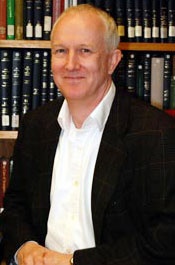DAVID CANTOR, PH.D.
David Cantor served as a historian and former director in the Office of NIH History at the National Institutes of Health, Bethesda, Maryland. His scholarly work has focused on the history of medicine in the twentieth-century, most recently the histories of cancer, stress and medical film. He is series editor (edited collections) of Social Histories of Medicine published by Manchester University Press.
Educated at the University of Lancaster, U.K. ( Ph.D.), Cantor joined the Office in 2007 after holding positions at several universities in the U.K., and at The Johns Hopkins University, the National Library of Medicine and the National Cancer Institute in the U.S.A.
Contact:
Email: djcantor@hotmail.com
SELECT PUBLICATIONS
BOOKS
(Co-editor) Health Education Films in the Twentieth Century (co-edited with Christian Bonah and Anja Laukötter), Rochester, NY: Rochester University Press, 2018.
(Co-editor) Stress, Shock, and Adaptation in the Twentieth Century (Co-edited with Edmund Ramsden) Rochester: University of Rochester Press, 2014.
(Co-editor) Meat, Medicine, and Human Health in the Twentieth Century (co-edited with Christian Bonah and Matthias Dörries), London: Pickering and Chatto, 2010.
(Editor) Cancer in the Twentieth Century, Baltimore and London: Johns Hopkins University Press, 2008.
(Editor) Reinventing Hippocrates, Aldershot, Hampshire: Ashgate, 2002
ARTICLES
“Conversion Narratives, Health Films and Hollywood Filmmakers of the 1930s and 1940s,” (with Vincent Lowy), in Christian Bonah, David Cantor, and Anja Laukötter (eds.), Health Education Films in the Twentieth Century, Rochester, NY: Rochester University Press, 2018, pp. 143-170.
“Between Movies, Markets, and Medicine: The Eastern Film Corporation, Frank A. Tichenor, and Medical and Health Films in the 1920s,” in Christian Bonah, David Cantor, and Anja Laukötter (eds.), Health Education Films in the Twentieth Century, Rochester, NY: Rochester University Press, 2018, pp. 43-84.
“Introduction,” (with Christian Bonah and Anja Laukötter), in Christian Bonah, David Cantor, and Anja Laukötter (eds.), Health Education Films in the Twentieth Century, Rochester, NY: Rochester University Press, 2018, pp. 1-40.
“Cancer: Radical Surgery and the Patient,” in Thomas Schlich (ed.), The Palgrave Handbook of the History of Surgery, London: Palgrave Macmillan, 2018, pp. 457-477.
“Cancer Screening,” in Mark Jackson (ed.), The Routledge History of Disease, London and New York: Routledge, 2016, pp. 358-377.
“Cancer,” in Hugh Slotten (editor-in-chief), The Oxford Encyclopedia of the History of American Science, Medicine, and Technology, Volume 1, New York: Oxford University Press, 2014, pp.164-171.
“Before Survivorship: The Moment of Recovery in Twentieth-century American Cancer Campaigns,” Social History of Medicine, 27 (3) August 2014, 440-465.
Man Alive! (1952): Cartoon Fun with Cancer, Cars and Companionate Marriage in Suburban America, Bethesda: National Library of Medicine, 2014. HTML version. View the film.
The Reward of Courage (1921). A Rediscovered Cancer Film of the Silent Era, Bethesda: National Library of Medicine, 2013. View the film
“Our Shapeshifting Companion,” (Essay review of Siddhartha Mukherjee, The Emperor of All Maladies: A Biography of Cancer, Fourth Estate, 2011), London Review of Books, Vol. 35, No. 5, 7th March 2013, pp. 25-26.
“Between Prevention and Therapy: Gio Batta Gori and the National Cancer Institute’s Diet, Nutrition and Cancer Programme, 1974-1978,” Medical History, 56, 4, October 2012, pp. 531-561.
“Le National Cancer Institute: problème d’une intervention fédérale contre le cancer dans l’Amérique du début du XXe siècle,” in Didier Foucault (ed.), Lutter contre le cancer (1740-1960), Toulouse: Éditions Privat, 2012, pp. 329-358.
“Confused Messages: Meat, Civilization, and Cancer Education in the Early Twentieth Century,” in David Cantor, Christian Bonah and Matthias Dörries (eds.) Meat, Medicine, and Human Health in the Twentieth Century, London: Pickering and Chatto, 2010, pp.111-126.
(with Christian Bonah), “Meat, Medicine, and Human Health in the Twentieth Century,” in David Cantor, Christian Bonah and Matthias Dörries (eds.) Meat, Medicine, and Human Health in the Twentieth Century, London: Pickering and Chatto, 2010, pp. 1-31.
“Choosing to Live: Cancer Education, Movies, and the Conversion Narrative in America, 1921-1960,”Literature and Medicine 28 (2) Fall 2009, pp. 278–332.
“Radium and the Origins of the National Cancer Institute,” in Caroline Hannaway (ed.), Biomedicine in the Twentieth Century: Practices, Policies, and Politics, Amsterdam: IOS Press, 2008, pp. 95-146.
“Cancer Control and Prevention in the Twentieth Century,” Bulletin of the History of Medicine, 81, (1) Spring 2007, pp. 1-38. (PDF - 432KB)
“Uncertain Enthusiasm: The American Cancer Society, Public Education, and the Problems of the Movie, 1921-1960,” Bulletin of the History of Medicine, 81, (1) Spring 2007, pp. 39-69.
“A Word from Your Sponsor?” Times Higher Education Supplement, No. 1782, 23rd February 2007, pp.16-17.
“The Politics of Commissioned Histories (Revisited),” in Ronald E. Doel and Thomas Söderqvist (eds.), The Historiography of Recent Science, Medicine, and Technology. Writing Recent Science, London and New York: Routledge, 2006, pp.45-66.
“The Frustrations of Families: Henry Lynch, Heredity, and Cancer Control, 1962-1975,”Medical History, 50, (3), July 2006, pp. 279-302.
“Cancer, Quackery and the Vernacular Meanings of Hope in 1950s America,” Journal of the History of Medicine and Allied Sciences, 61, (3) July 2006, pp.324-368.
“Between Galen, Geddes and the Gael: Arthur Brock, Modernity and Medical Humanism in Early-Twentieth-Century Scotland,” Journal of the History of Medicine and Allied Sciences, 60, (1) January 2005, pp.1-41.
Essay review of Owsei Temkin, ”On Second Thought” And Other Essays in the History of Medicine and Science, Baltimore: Johns Hopkins University Press, 2002, in Theoretical Medicine and Bioethics, 25, (2), April 2004, pp.157-164.
“Cancer,” in Dominique Lecourt, François Delaporte, Patrice Pinell, Christiane Sinding, (eds.),Dictionnaire de la Pensée Médicale, Paris: Presses Universitaires de France, 2004, pp.195-201.
“Representing 'The Public': Medicine, Charity and Emotion in Twentieth-Century Britain,” in Steve Sturdy (ed.), Medicine, Health and the Public Sphere in Britain, 1600-2000, London and New York: Routledge, 2002, pp.145-168.
“The Uses and Meanings of Hippocrates,” in David Cantor (ed.), Reinventing Hippocrates, Aldershot, Hampshire: Ashgate, 2002, pp.1-18.
“The NAME and the WORD: Neo-Hippocratism and Language in Interwar Britain,” in David Cantor (ed.), Reinventing Hippocrates, Aldershot, Hampshire: Ashgate, 2002, pp.280-301.
Contact Details:
David Cantor, Ph.D.
Email: djcantor@hotmail.com


